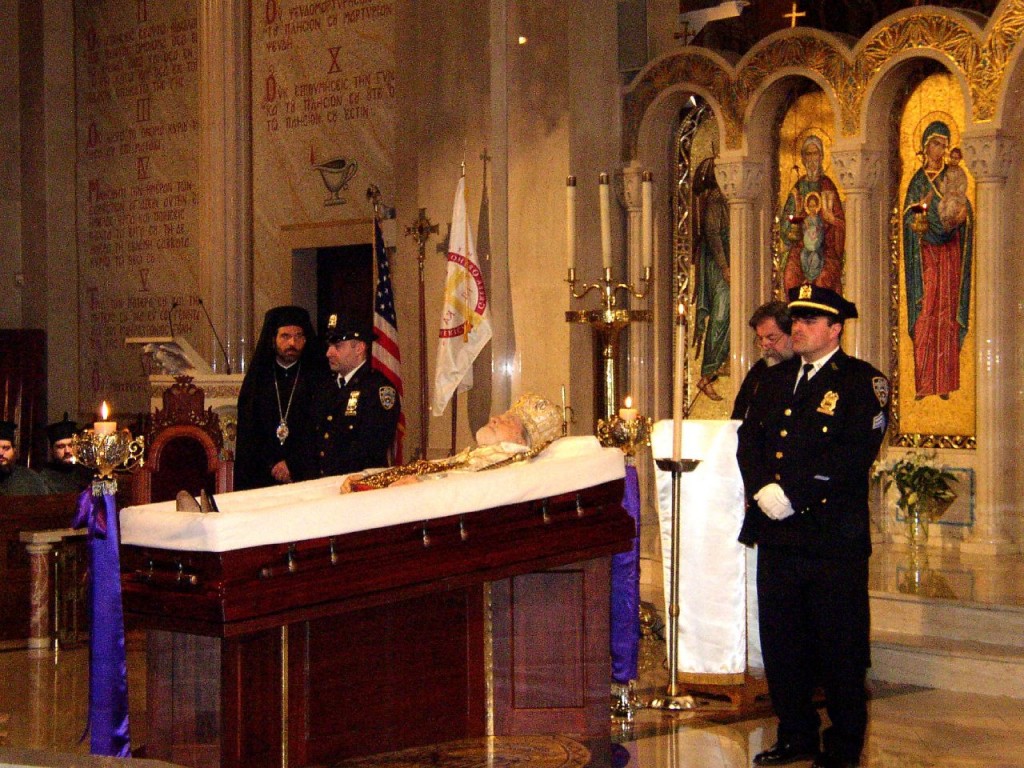
The body of Archbishop Iakovos (Coucouzis) of America lying in state at Holy Trinity Greek Orthodox Cathedral, NYC, 2005
Those of us who are doing the tinkering on the machinery of the newly founded SOCHA have been astounded by the outpouring of attention that our site has received. From the stats, we’re getting around 200 views per day on the site, and we now have more than 500 fans following us on Facebook (from less than 10 three weeks ago). There clearly seems to be a building interest in the subjects that are being covered here.
I believe it’s thus important for us to comment every so often on why it is we’re doing this work. I can’t speak directly for the other members of the Executive Board, but we’ve spoken about this, and I think they’re of similar minds. (You can listen to Matthew talk about why he thinks this subject is important on his inaugural podcast from May 5.)
As for myself, I got interested in the subject of American Orthodox history most particularly while I was in seminary. Initially, I started looking into our common history because while in seminary I ran (for the first time in my Orthodox life) headlong into some rather shrill jurisdictional agendas, most of them being based on historical claims. Though I had never really bothered much with such things in parish life prior to seminary, I found it all strangely compelling. At first, this is what I spent most of my historical reading time on, trying to determine whether the claims really had any merit. Over time, though, I started running into stories that I found a lot more interesting than the claims about who was “here first” or whatnot. (I also came to the conclusion that it didn’t really matter who was here first, both because that wouldn’t help us now and also because the canonical tradition actually doesn’t support ecclesiastical flag-planting.)
Some of the stories seemed mainly irrelevant to the issues of jurisdiction, claims, etc., such as the queer tale of Archbishop Aftimios Ofiesh (regarding whom I did my M.Div. thesis). But what tied many of them together, if only in a certain culturally thematic way, is the question of unity.
I believe I speak for all the core members of SOCHA when I say that we want unity of every sort in Orthodox America. (That’s not a party line, though, mind you. It just happens to be what all of us want.) So that leads us to the question of why we decided to form the Society and why we took the step of making this website our first major project together.
I believe our true motivation comes down to the sheer joy of the narrative. There is something ugly about subjecting a narrative to an agenda, and it distorts not only the historical record itself but also the humanity and humaneness which are inherent in all stories about God’s sons and daughters. Ideology is not the same as theology or history. The latter two are much more akin to each other than either are to the former. In all true theology, we have a narrative into which we find ourselves initiated. The Gospel itself takes the form of a story. Thus, history is something like the Gospel and may well communicate the Gospel. And we know that History, when revealed in the eschaton in all its grandness and glory, will indeed reveal the Gospel. We will have found that all human history was really the Gospel all along.
Thus, we study history and try to learn the stories of our forebears in the faith, not merely so we can “learn from” the past, but so we can enter into the story itself. American Orthodox Christian history is really far more fascinating, varied and diverse than any of the jurisdictional ideologues prefer to admit, because it impinges upon their systems. Nothing can be admitted into those hermetically sealed thought systems except what feeds the ideology.
But as we sift through the letters, newspaper clippings, photographs, documents, oral histories, and so on which constitute the archaeological flotsam and jetsam of the historian, we discover something so much more wonderful than a “rightful” claim to jurisdiction. There is even a greatness and dignity that we can see in people only after they are departed from this life. In all that historical matter we may actually see Christ, because a true engagement with sources without any ideology demanding their service always yields things that are far more surprising and delightful. In the end, it’s mankind we see, and through him, often quite unexpectedly, we also see his Creator.
So, that’s why I love American Orthodox history.